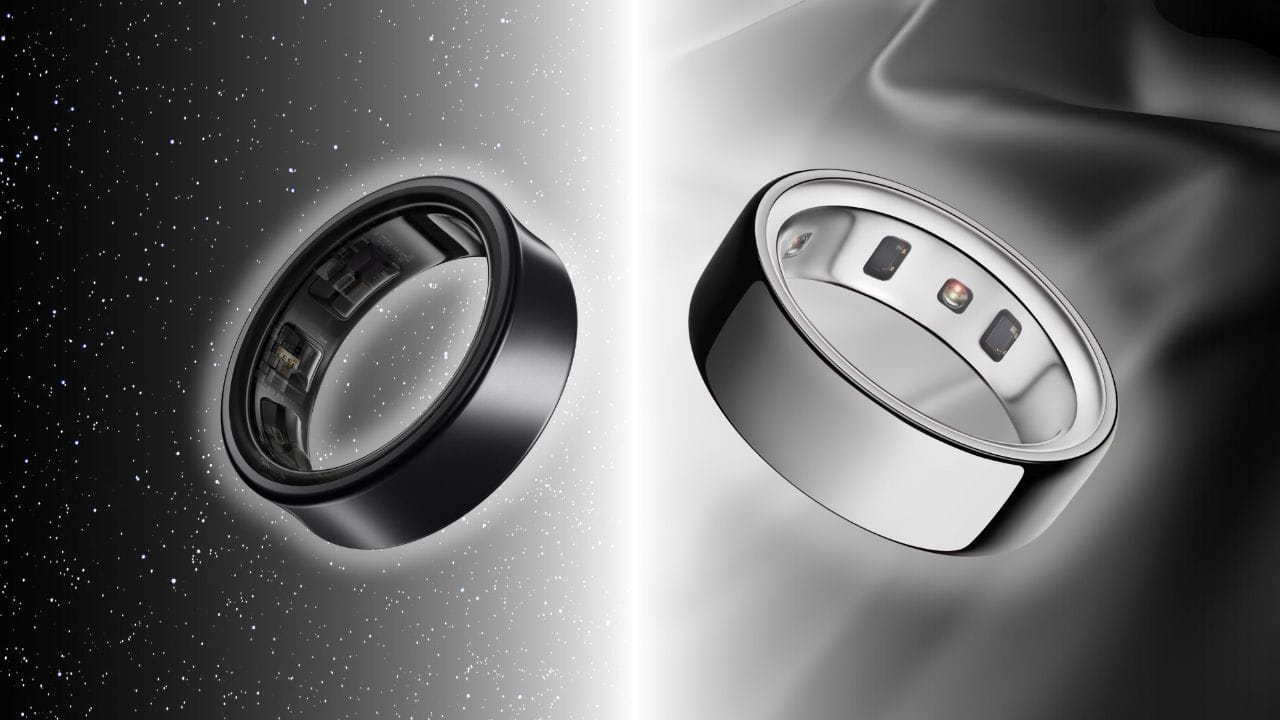We include links to products we think are useful for our readers. If you click and buy a product through one of the affiliate links on this page, we may earn a small commission. Please read our disclosure.
As a big fan of wearables, I’m always excited to try new gadgets that help me track my fitness progress. Being an HIIT junkie, I thrive on seeing tangible improvements, whether it’s my recovery times or daily activity metrics. Smart rings have been with me for a while now, so I decided to get into two of the most talked-about options in 2024: the Samsung Galaxy Ring and the Oura Ring 4.
Both are packed with health-tracking features, but they each come with their own quirks and advantages. Let’s explore their design, features, battery life, compatibility, and overall value.
Samsung Galaxy Ring vs. Oura Ring Gen 4: Which is Better?
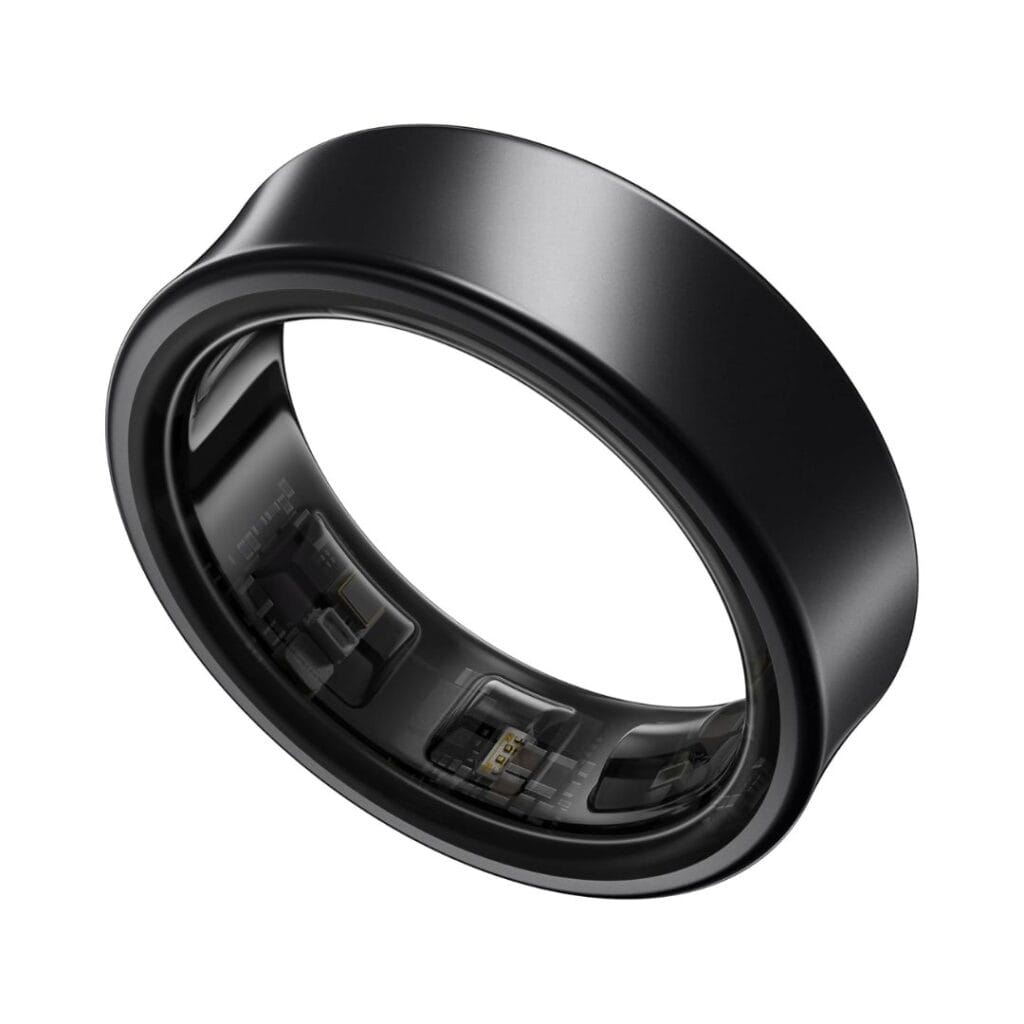
Samsung Galaxy Ring
A sleek health tracker made from titanium, available in Titanium Black, Gold, and Silver, with sizes ranging from US 5 to 13.
Priced at $399.99, no subscription afterwards.
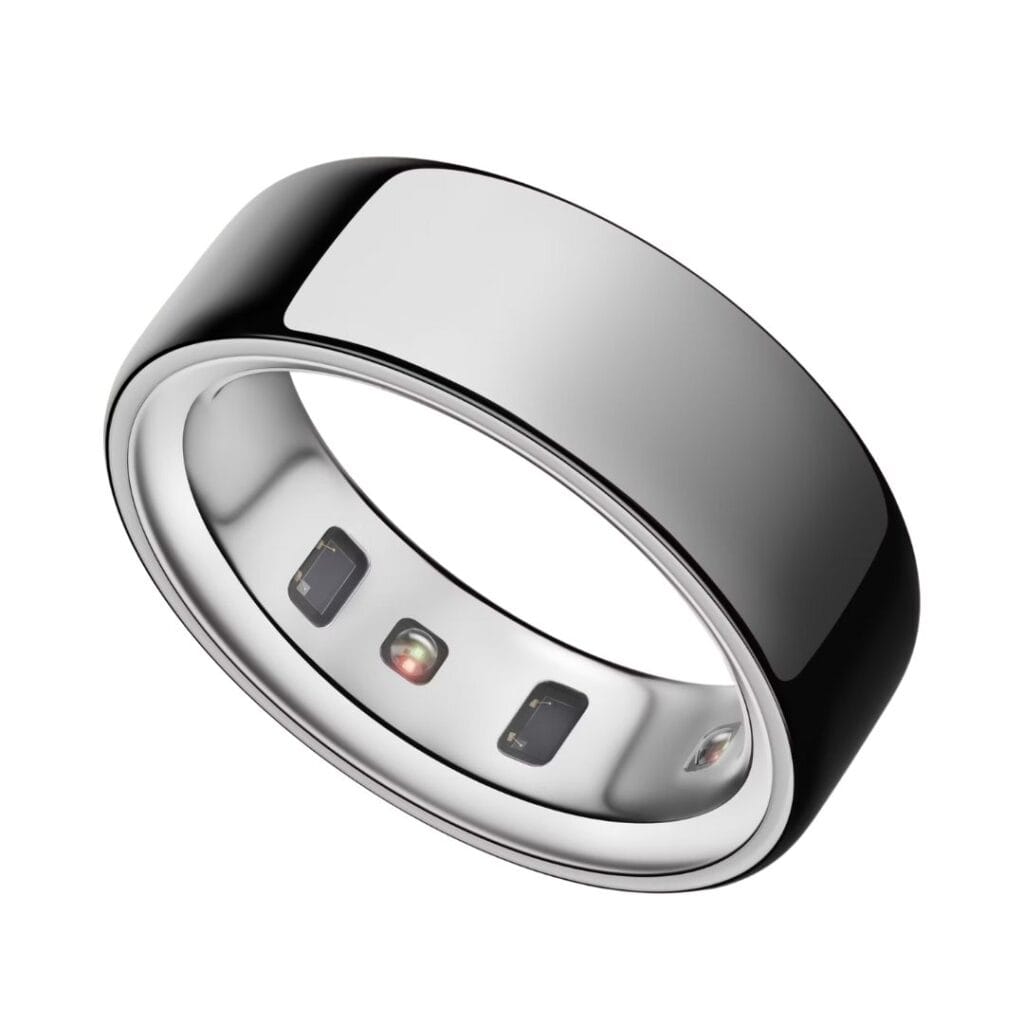
Oura Ring Gen 4
A detailed health tracker offering over 30 biometric features, available in six finishes like Rose Gold and Stealth, with sizes from US 4 to 15.
Priced at $349 plus a $5.99/mo subscription.
Design and Comfort
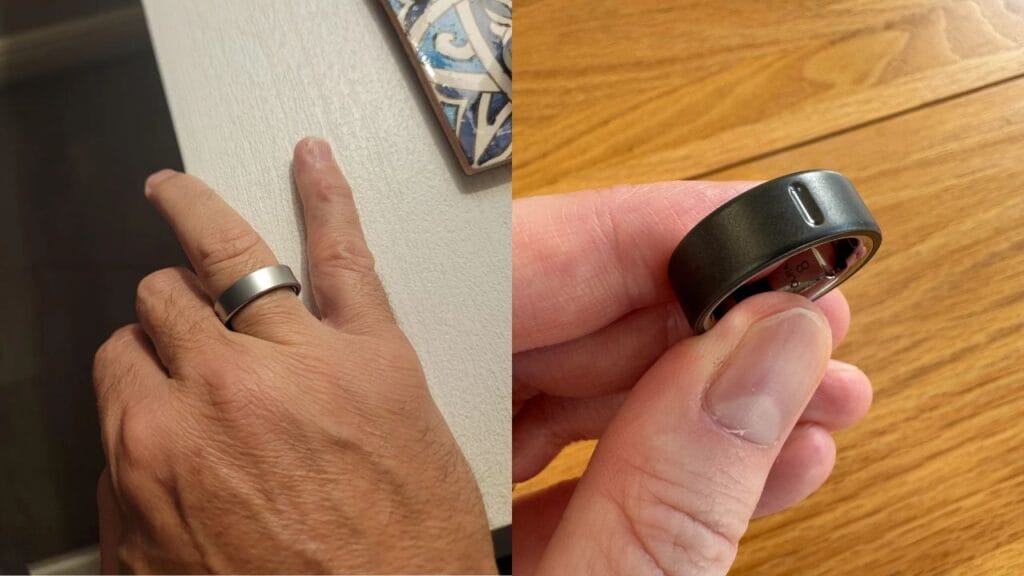
When it comes to design, both rings bring style and functionality to the table. The Samsung Galaxy Ring boasts a titanium build, making it lightweight yet durable. Available in Titanium Black, Gold, and Silver, it offers nine size options (US 5 to 13). I found the Titanium Black finish to be particularly versatile, working well for both casual and formal settings. The recessed design minimizes scratches, which is great if you’re someone like me who wears it during gym hours.
The Oura Ring 4 takes a similar minimalist approach, but with a wider range of finishes, including Rose Gold and Stealth (I chose Stealth because I felt like I was John Wick at the time), and a broader size selection (US 4 to 15). Its interior sensors are recessed, which adds to the comfort factor, especially during sleep. I tried using the sizing kit as I’m more of a guy that loves having it on the index finger.
And as someone with average-sized fingers, I appreciated Oura’s size inclusivity—it felt like they truly catered to a diverse audience. My wife, who has smaller, even loves it. That said, Oura’s design can feel a bit chunkier compared to Samsung’s sleeker profile. The latter seems to be a bit more lightweight as well.
Health Tracking Features
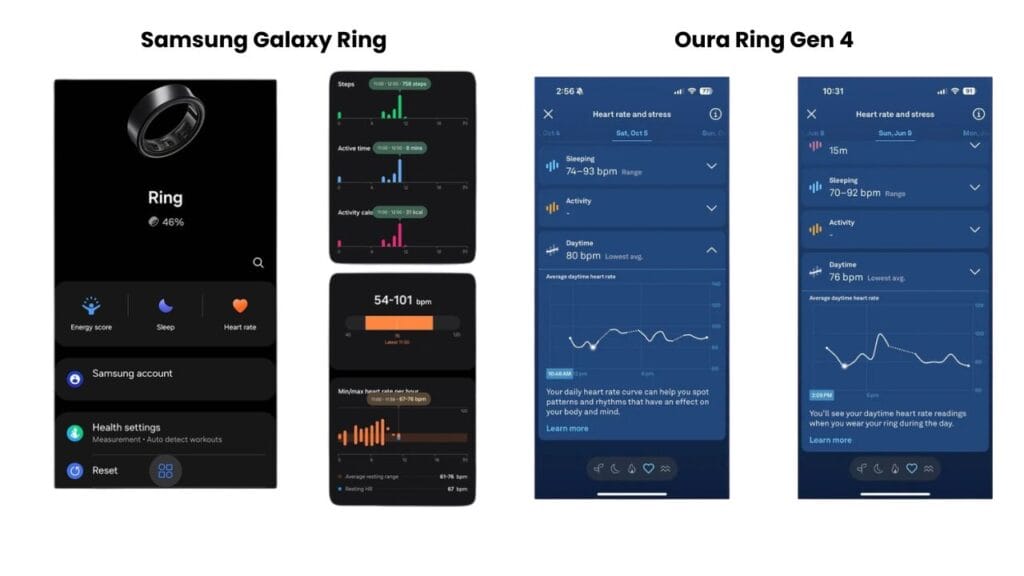
The Samsung Galaxy Ring focuses on essentials like sleep tracking, heart rate monitoring, and activity tracking. Its standout feature is the Energy Score, which combines your sleep and activity data to give a simple readiness snapshot. While it’s user-friendly, I noticed a lack of deeper insights. I needed something more granular. It has its newest feature, Galaxy AI, which did its job in generating tailored data.
On the flip side, the Oura Ring 4 is a powerhouse for data enthusiasts. With over 30 biometric tracking capabilities, it monitors sleep stages, heart rate variability, and even stress levels. Its Readiness Score is more detailed, helping you decide whether to push harder or rest. Oura also automatically detects over 40 types of physical activities.
After wearing the Oura Ring 4, one thing I really appreciated is its tagging system. It allows me to track specific habits or unusual activities, like late meals or stressful events, and correlate them with changes in my sleep or readiness scores.
On the Samsung Galaxy Ring side, simplicity shines. It delivers reliable basic tracking with features like its Energy Score, which combines sleep and activity for an easy-to-understand daily readiness metric. But it lacks some advanced customization options that I’ve grown to enjoy with Oura. Another thing I missed was the ability to track specific triggers like sleepless nights or late-night snacks.
During my testing, I found Oura’s sleep analysis to be more insightful, giving detailed breakdowns of REM and deep sleep cycles. If you enjoy dissecting your data, Oura outshines Samsung in this department.
One thing I noticed though is how sensitive Oura Ring becomes when it gets interfered with something external—sweat, could be hitting your ring on table corners, or if the size isn’t the right fit. It just abnormally behaved and left gaps on the data. It’s something to be aware of when your daily routine consists of moving too much around.
Battery Life
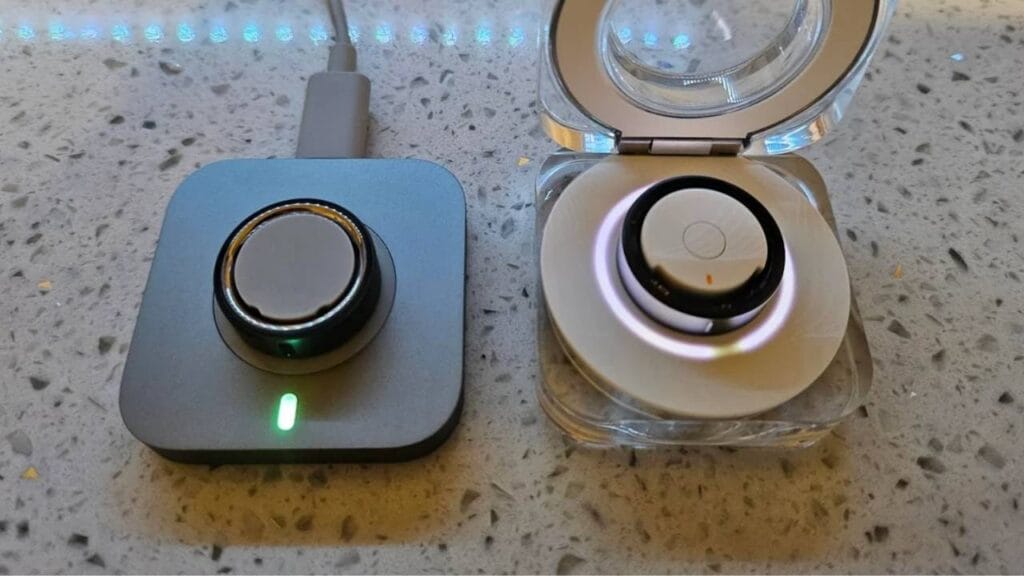
Battery life is a critical factor for wearables, and both rings perform well here. The Samsung Galaxy Ring lasts up to seven days on a single charge, and its portable charging case offers two full charges. I appreciated the LED indicators on the case, but the ring’s charging speed felt a bit slow.
The Oura Ring 4 slightly edges ahead with up to eight days of battery life. Its charging process is also faster, taking only 20 to 80 minutes for a full charge. At only 13-15% decrease in battery, it only lasted up to 7 days when using all features.
As someone who often forgets to charge devices overnight, I loved how quickly Oura was ready to go. That said, if you’re planning extended trips, Samsung’s charging case provides more convenience by eliminating the need for frequent outlet access. It could go on for four days and I found it with 70% battery life.
Compatibility and App Ecosystem
Compatibility is an area where these two rings differ significantly. The Samsung Galaxy Ring integrates seamlessly with the Samsung Health app, making it a natural choice for those already invested in the Samsung ecosystem. However, it’s exclusive to Samsung Galaxy phones, which can be bad if you use a different brand.
The Oura Ring 4, on the other hand, offers broader compatibility. It works with both iOS and Android devices and integrates with apps like Apple Health, Google Fit, and Strava. As someone who values flexibility, I found Oura’s app ecosystem to be much more versatile. It seemed like the Oura app feels more polished compared to Samsung’s, which can be a bit clunky for non-Samsung users.
Pricing and Value
The Samsung Galaxy Ring is priced at $399.99 with no additional subscription fees. While this makes it a straightforward one-time investment, its limited compatibility might not justify the price for non-Samsung users. On the other hand, the Oura Ring 4 starts at $349 but requires a subscription to unlock its full potential. For data enthusiasts, the added insights might be worth it, but casual users might find the recurring fee frustrating.
From my perspective, Oura offers better value if you’re looking for comprehensive health insights and don’t mind the subscription. Samsung is ideal if you’re deeply embedded in the Galaxy ecosystem and prefer a no-fuss solution.
Both the Samsung Galaxy Ring and the Oura Ring 4 are impressive devices, but they cater to different needs. If you’re a Samsung user who values simplicity and seamless integration, the Galaxy Ring is a solid choice. However, if you’re after detailed health metrics and cross-platform compatibility, the Oura Ring 4 is the better pick.
Personally, I’d go with the Oura Ring 4. Its in-depth tracking and versatile app integrations make it more aligned with my fitness goals. That said, I understand why someone might choose Samsung’s option—especially if they’re already using a Galaxy device. Ultimately, your choice will depend on your priorities: ecosystem loyalty versus data depth.
Winner: Oura Ring Gen 4
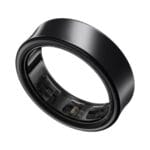
Samsung Galaxy Ring
A sleek health tracker made from titanium, available in Titanium Black, Gold, and Silver, with sizes ranging from US 5 to 13.
Priced at $399.99, no subscription afterwards.
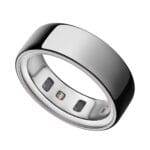
Oura Ring Gen 4
A detailed health tracker offering over 30 biometric features, available in six finishes like Rose Gold and Stealth, with sizes from US 4 to 15.
Priced at $349 plus a $5.99/mo subscription.
After weighing all the factors, the Oura Ring 4 emerges as the better overall option. Its ability to track over 30 biometrics, detailed sleep analysis, and broader compatibility with multiple platforms make it a more versatile and powerful health tracker. For someone who loves digging into data and seeing the full picture of their health, Oura is the clear winner.
The Samsung Galaxy Ring, while impressive in design and functionality, feels more tailored to Samsung users who want basic tracking without subscriptions. Its simplicity is appealing, but its limited compatibility and lack of advanced insights hold it back in a broader comparison.
Ultimately, if you’re tied to Samsung’s ecosystem and value simplicity, go for the Galaxy Ring. However, for those who want more comprehensive health data and flexibility, the Oura Ring 4 is worth the investment—even with its subscription model.

